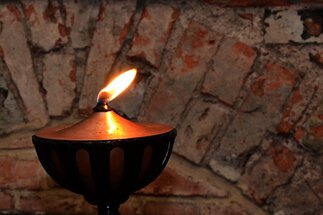
Last Sunday of the Church Year
Matthew 25:1–13 November 24, 2019 St. John’s Lutheran Church—Chicago, IL In the name of + Jesus. It’s hard to tell a fool that he’s a fool. They don’t tend to take that sort of criticism very well. In fact, most fools think that they’re quite wise. A good chunk of internet traffic is precisely this: fools pretending to be wise. So the question that is begged is, are you really as wise as you think you are? Assuming that you’re wise, perhaps you’re making a fool out of yourself, and no one is willing to tell you because fools can’t be told that they’re fools.
It’s reported that Socrates, one of the wisest persons ever to have lived, said at the end of his career that he knows one thing: that he knows nothing. So, if Socrates can’t tell if he’s wise or foolish, how are we to tell. And the stakes for us are much higher than a reputation on the internet or a legacy of being a wise guy—for us the difference between wisdom and foolishness is the difference between access to God’s kingdom and being locked out in the dark.
This is the purpose of Jesus’ parable for the close of the Church year. You can’t tell a fool that he’s a fool; he’ll think you’re the fool. But you can tell a fool a story. So, Jesus tells us a story. “The kingdom of heaven will be like ten virgins who took their lamps and went to meet the bridegroom. Five of them were foolish, and five were wise. For when the foolish took their lamps, they took no oil with them, but the wise took flasks of oil with their lamps (vv 1–4). The distinction between the wise and foolish at first appears to be the amount of oil they have with them. But in another situation with a different wedding and a different bridegroom, the amount of oil would have been just fine. This would have been a group of ten wise virgins. But there is a twist that reveals what makes them foolish: this is no regular wedding and this is no regular bridegroom. As the bridegroom was delayed, they all became drowsy and slept. But at midnight there was a cry, ‘Here is the bridegroom! Come out to meet him.’ Then all those virgins rose and trimmed their lamps. And the foolish said to the wise, ‘Give us some of your oil, for our lamps are going out.’ But the wise answered, saying, ‘Since there will not be enough for us and for you, go rather to the dealers and buy for yourselves.’ (vv 5–10). This bridegroom is not just fashionably late. He doesn’t wait for the guests to arrive so that he can make an entrance. He’s delayed so long that both the wise and the foolish fall asleep. And he doesn’t actually come to the wedding party until midnight. For about 10 years I worked in catering and I attended too many wedding parties to count. Midnight is the time when most wedding parties start to wind down, and when we tried to get the drunk bridesmaids off the dance floor—we wanted to clean up and go home. Midnight is not the time to start a wedding party. But this is no ordinary wedding and this is no ordinary bridegroom. The foolishness of the five was that they assumed they knew everything they needed to know about weddings and bridegrooms and that they were not prepared for a bridegroom who breaks the mold. Afterward the other virgins came also, saying, ‘Lord, lord, open to us.’ But he answered, ‘Truly, I say to you, I do not know you.’ Watch therefore, for you know neither the day nor the hour.” (vv 11–13). After all their preparations, after securing the oil that they forgot to pack, after making their way back to the wedding feast, the foolish ones are met with fear. The bridegroom has a harsh rebuke for the tardy bridesmaids. They are locked out. How do you ensure that you remain wise in waiting for the Lord’s return? At this point we could outline some spiritual exercises, “put some oil in your lamp,” so to speak. We could jack up the emotional appeals of our worship and fill you up with spiritual warm fuzzies. That might keep your lamps burning for a time, but it won’t make you wise. It may look like wisdom to begin with, but it will end with fear. The fear of the Lord is the end of foolishness. But on the other hand, “The fear of the Lord is the beginning of knowledge;” says the Proverb, “fools despise wisdom and instruction” (Prov. 1:7). The fear of the Lord is the beginning of wisdom. Not fear as you would a masked intruder, or even a cruel and abusive father. The fear of the Lord that puts you on the path to wisdom is a reckoning—a reckoning that this God is totally unpredictable; a reckoning that any attempts to get Him under your thumb will reveal just how foolish it is to expect Him to conform to your expectations. He is not a tame God, to borrow a figure of speech from C. S. Lewis. Wisdom is knowing that God runs His kingdom and His eschatological feast in the way that He runs it. He is not on your timetable; He does not order his kingdom based on your convenience. The Bridegroom has been delayed. 2,000 years ago He initiated the nuptial feast with His death on the cross and His victorious resurrection. He promised a return in the same way He departed—on the clouds with great glory. Fools despise wisdom and instruction, says the Proverb. Today we are completing a course of instruction for catechumens of the Church. But instruction isn’t only for those who are new to the faith; it’s ridiculously easy to fall back into foolishness. In our time of instruction these past weeks, we’ve spent some time listening to the wisdom of the ancient Church. Here’s another bit of wisdom in the form of a prayer from the ancient Church—wisdom that will help you prepare for Christ’s return. It’s a short prayer—one word in Jesus’ native language, in fact. Maranatha. It means, “Come quickly, Lord Jesus.” And I think that’s a suitable way to end our Church Year. Maranatha. Rev. Jacob Ehrhard
If you benefited from this devotion and would like to support the ongoing ministry of St. John's Lutheran Church and School, click below to make a one-time or recurring contribution through our secure giving page.
0 Comments
Your comment will be posted after it is approved.
Leave a Reply. |
BlogCategories
All
SearchArchives
July 2024
|
